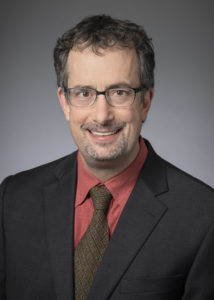Interview with Dr. John Spertus – Distinguished Scientist of AHA18
The road to becoming an accomplished researcher is not easy. As early career researchers, we spend many hours generating ideas that never come to fruition, conducting research that fails, writing manuscripts to see countless revisions and rejections, and grants that never succeed. Sometimes, it seems that those who succeeded have a secret formula that they are not sharing. I had the privilege of interviewing Professor John Spertus, MD, MPH, the Distinguished Scientist of AHA18, who seems to have figured out this secret formula. Prof. Spertus is the Clinical Director of Outcomes Research at Saint Luke’s Mid America Heart Institute. His research focuses on the importance of measuring clinical outcomes, creating and implementing risk models that provide health care tailored to individual patients.
Here are some of the questions I asked Professor Spertus:
1. How did you become a national leader in defining patient outcome measures?
The goal was never to become a “leader,” but rather to commit myself to overcome what I perceived to be grievous “wrongs” in the way we were conducting trials, engaging patients in their care and driving our profession to improve practice. When I was a fellow, it became incredibly clear to me that our treatments (e.g. PCI) were being justified based upon surrogate outcomes, but not on how the treatments improved patients’ symptoms, function and quality of life. I wanted to begin measuring patients’ health status, but first needed to develop the tools to do so. In retrospect, focusing on developing the infrastructure and tools to better study and improve care was a brilliant strategy – I just didn’t know it at the time. To me, I was trying to help improve our understanding of how diseases and their treatment affects patients. It was not considered “real science” by many at my institution, but perseverance and commitment to the vision really paid off. Similarly, my current commitment to implementing risk models – the foundation of precision medicine – seems to be an obvious solution to improving the value of healthcare so that we can preferentially deliver care to those that most benefit, while avoiding the costs and risk in those who don’t. Like PROs 20 years ago, there seems to be very little interest by my professional colleagues to redesign their current practice patterns, but I only hope in another 10 to 20 years that we all embrace this strategy of delivering care. I believe that holding fast to your vision and working to engage others in your dream is how one becomes a success and, ultimately, a leader.
2. When did you consider yourself a success?
I am still learning to be proud of my accomplishments, although I still haven’t contributed all that I would like. I am incredibly happy with the colleagues I have gotten to know who have all joined this vision to improve care and outcomes. The field has grown tremendously (when I started, there were only a few cardiologists in this area, as most academics favoured basic science or clinical trials) and that is incredibly gratifying to see. In particular, I revel in the colleagues I have helped inspire and train. To see them go on to do bigger and better things than I ever could have accomplished makes me very gratified and to believe that I have been a “success.”
3. What was your biggest career challenge?
Throughout my career, I have always pursued a very atypical, independent path. Moving to UMKC, which was not a vigorous research institution at the time, was a big challenge. There were not colleagues to collaborate with or learn from and the field did not have much of an infrastructure or “proven path” to success. However, the others in outcomes research – Harlan Krumholz, John Rumsfeld, David Cohen, Eric Peterson and many others – were similarly isolated, to some extent, at their institutions. Being able to create friendships and to create inter-institutional collaborations was tremendously validating to me as I started. Moreover, the interest and support of the AHA and ACC in the evolving fields of quality of care and outcomes research was a huge help.
4. How do you push through your worst times?
I vent. I find it very frustrating to face rejections – even today. I have moments of getting angry, followed by an agitated urgency to address whatever obstacles have arisen. I think addressing these challenges and moving on is the best way to navigate difficult times. Family and friends are very helpful, but ultimately, it is the passion to make the world a better place that drives me to overcome the innumerable setbacks I face and to move on. As one gets older, you forget many of the frustrations and delight in the progress that has occurred. But to get to this place, you need the perseverance and passion to get through the obstacles.
5. What’s your advice for young researchers like me?
The number one recommendation is to find an area where you feel passionately that things could be better. Opportunities exist, if only taken, to improve patients’ care and outcomes. Once this is identified, build the tools and skills to take your insights of how things could be improved to actually contribute to changing the world for the better. Share and collaborate as much as you can. Not only can you learn much from others, but having colleagues to share the journey with you makes it so much easier to weather the setbacks and so much more fun to celebrate the successes.

Professor John Spertus, MD, MPH was recognised as American Heart Association’s Scientific Sessions 2018 Distinguished Scientist. The award recognizes prominent scientists and clinicians who have made significant and sustained contributions to advancing the understanding, management and treatment of cardiovascular disease and stroke.